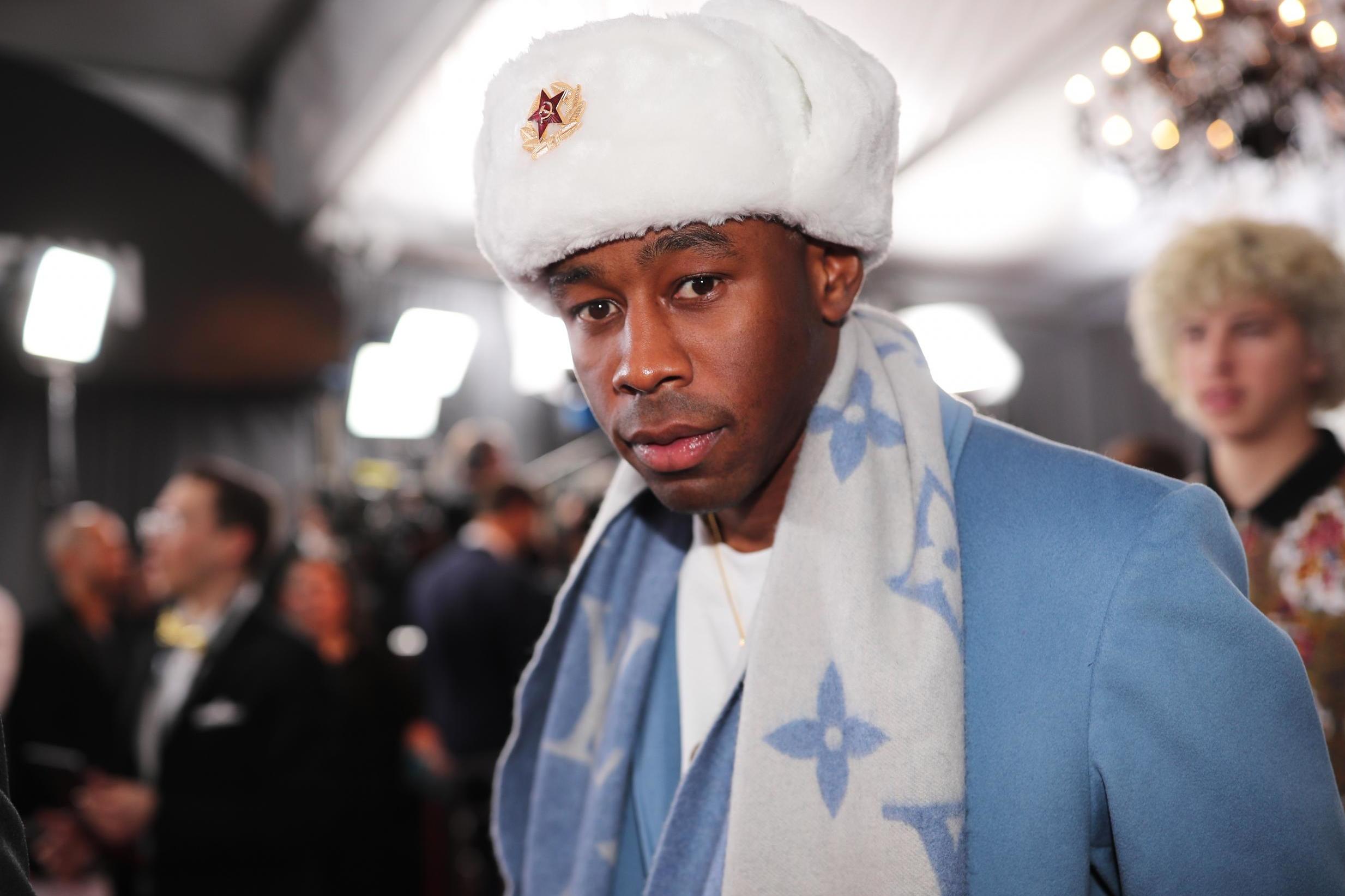Tyler, the Creator's Christmas EP is a reminder that his UK ban is beyond embarrassing
In her new column examining a burning issue of the week in culture, Lucy Jones explores the evolution of the only artist currently banned from the UK because of their lyrics


And lo! It came to pass. Last week there went out a decree from Mariah Carey, the queen of Christmas tunes, that all the world should crack out the holiday music from the day of Thanksgiving, or 22 November. Which was great news because Tyler, the Creator just released a brilliant, six-track Christmas EP.
Music Inspired by Illumination & Dr Seuss’ The Grinch might not sound like the sort of thing you’d expect from a California rapper who little more than a decade ago was busy swallowing cockroaches and writing lyrics about raping pregnant women and necrophilia, but it’s true. He even went on Twitter to explain that his aim for the EP was to keep “seven-year-olds in mind but wanting the parents to listen also”. How times have changed.
But here’s the real absurdity: the talented, inventive, ever-evolving creator that is Tyler is still banned from visiting the UK thanks to Theresa May. Even Snoop Dogg had his ban overturned after a short while (thanks to a personal request from the Queen, according to Snoop, whose “grandbabies” apparently love his music).
To recap: Tyler was banned from visiting the UK in 2015 for three to five years and had to cancel a bunch of tour dates, including the Reading and Leeds festivals. May, while Home Secretary, cited lyrics from his first mixtape, Bastard, which was released six years earlier, in 2009. Much of Bastard is admittedly gross, but he was 17 at the time, and if we banned all artists who made offensive material in their earlier days, the list would be endless. For a start, has she heard of Eminem?
“Coming to the UK is a privilege,” the letter from the government said on his ban, “and we expect those who come here to respect our shared values. The home secretary has the power to exclude an individual if she considers that his or her presence in the UK is blah blah blah blah blah.”
In 2016 track “My Ego”, Tyler responded, saying: “Tell Theresa May to let me in / I been going in since 2010 / It gotta be the colour of my skin / Cause there’s n****s there / That doing more damage than my pen, man / Said some old lines was offensive / I was young, I can’t apologise for that shit / They took my fiction literature for literal / I ain’t no motherf***in’ criminal.”
It’s a shame because, as artistic evolutions go, Tyler’s has been one of the most interesting and surprising to watch. Sure, there were flecks of the melodious, jazz-inflected dreamery of Flower Boy (2017) and Cherry Bomb (2015) in Wolf (2013), in tracks “Treehome95” and “Bimmer”, for example, but the reach and span of his creative development is comparable to Kanye West, say, or Kate Bush. His beats, arrangements and production have improved but he hasn’t compromised any of his playfulness or imagination.

At a time when most artists’ output tends towards entropy, he’s a rare beast. Even back in 2011 when he was releasing some pretty questionable stuff despite the glorious “Yonkers”, watching early Odd Future, the collective group he de facto leads at SXSW in Austin, Texas remains the most exhilarating gig I’ve ever been to. Tyler and Hodgy rapped from the corrugated tin roof before jumping into the frenzied crowd. It was pure dynamite.
In the last few years, Tyler has made efforts to disassociate himself from the homophobic and misogynistic lyrics of his earliest releases, which led Glaad (Gay & Lesbian Alliance Against Defamation) to call him out for his lyrics when he won a VMA in 2011 for Best New Artist. He called Goblin, released the same year, in which he uses the word “f*****t” multiple times horrible, and said he’d only keep seven of the tracks. In interviews and his own writing online, he’s said that he wasn’t using the words to refer to sexuality. “I’m not homophobic. I just think ‘f****t’ hits and hurts people. It hits. And ‘gay’ just means you’re stupid. I don’t know, we don’t think about it, we’re just kids,” he said to NME.

In 2015 he designed a T-shirt on his fashion label Golf Wang for Pride. Then, in 2017, tweets and lyrics from Flower Boy suggested he was coming out as gay or bisexual, or maybe just trolling everyone. This week, most stories online about Tyler weren’t about his new EP, however, but comments Jaden Smith made about him being his boyfriend. Are they a couple? Who cares. Everything Tyler says should be taken lightly. Added to that many rappers have historically used homophobic and misogynistic words and deployed graphic images that wouldn’t make it into a film certified 18. The main thing is that he stopped rapping hateful bile, and using anti-gay slurs, whether they’re intended in that way or not.
Tyler, the Creator’s continuing ban is unprecedented, and still in force because the prime minister decided he was “not conducive to the public good” in a strange, narrow minded, blinkered, stubborn, dogged decision. (Ring any bells?) Sure, the government has a colossal act of national self-harm to attend to, but it’s worth remembering that, while the history of Tyler is complex and problematic, the UK ban is deeply hypocritical, silly and embarrassing. He doesn’t belong with various neo-Nazis and criminals. And, as Tyler’s manager, Christian Clancy, questioned at the time: is race a conscious or subconscious factor at all?

Join our commenting forum
Join thought-provoking conversations, follow other Independent readers and see their replies
Comments
Bookmark popover
Removed from bookmarks